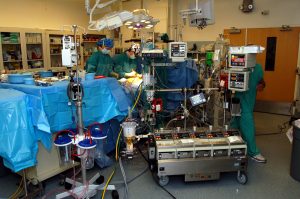CT Residency Program
Integrated 6-Year Residency Program in Cardiothoracic Surgery
- About the Residency
- Advantages of a 6-Year Program
- Components
- Eligibility
- How to Apply
- Residency Interview Dates
- Contact For More Information
About the Residency
In 2010, the Division of Cardiothoracic Surgery at the University of North Carolina at Chapel Hill began a six-year integrated residency program, which residents enter directly from medical school. Students at North American medical schools may apply for the program through the Electronic Residency Application Service (ERAS).
The curriculum includes rotations in vascular interventional radiology, endoscopy, cardiology, and endovascular surgery, and provides residents with the background and experience using these techniques in order to build a career as future “cardiothoracic specialists.” The program has been carefully designed to balance cardiovascular and thoracic care, and includes extensive exposure to fields relevant to thoracic surgery such as GI endoscopy, surgical oncology, and gastrointestinal (foregut) surgery. Completion of the program will lead to certification by the American Board of Thoracic Surgery.
The new program replaces UNC’s traditional 3-year cardiothoracic surgery residency program, which was preceded by a 5-year general surgery residency. UNC’s 3-year program was phased out in 2014.
All aspects of the 6-year curriculum are based on proven models of education currently available at the University of North Carolina. The curriculum preserves the significant contribution of general surgery and vascular surgery training to the development of a well-rounded cardiothoracic surgeon.
The training program is designed to allow progressive resident responsibility at all levels, as the resident gains knowledge and technical ability. Emphasis is placed on academic knowledge and accomplishment as well as clinical expertise in patient care. Graded responsibility under appropriate attending supervision is delegated to residents based on demonstrated capability.
Each resident is expected to review the goals and objectives for each rotation. When a resident does not meet the goals and objectives for a particular rotation, the resident is counseled by that service, offered advice for remediation, and the resident meets with the program director, where a program for remediation will be determined and will be monitored by the residency program director and the resident’s adviser.
We believe that this tightly focused, comprehensive curriculum will produce better trained cardiothoracic surgeons and will be gratifying to the resident physicians who complete the program. Read more about the curriculum and training schedule.

Advantages of a six-year residency program
In 2000, the American Board of Thoracic Surgery (ABTS) and the ACGME Residency Review Committee for Thoracic Surgery approved the development of six-year integrated cardiothoracic surgery residency programs in which an individual matches directly out of medical school for a stand-alone cardiothoracic program. At UNC, such a program shortens the current ABTS certification process by two years. In addition, this change also provides the opportunity to address the continued evolution of care in the treatment of cardiothoracic disease by modifying the traditional course of cardiothoracic surgical education.
The field of cardiothoracic surgery has evolved tremendously, offering patients many more options for the treatment of intra-thoracic disease. The complexity of cardiothoracic surgery has increased and it has become more dependent upon a multi-disciplinary team approach, involving primary care physicians, cardiologists, pulmonologists, anesthesiologists, intensivists, radiologists, pathologists, cardiac perfusionists, nurses, clinical coordinators, social workers, and others. Hence, the objective of this training program is to provide a more comprehensive and rational immersion in the diagnosis and management of all aspects of cardiovascular and thoracic diseases through multi-disciplinary training that better prepares the candidate for this new paradigm.
As technology evolves, conventional open and surgical treatments are giving way to less invasive strategies, more frequently utilizing hybrid operating rooms and less invasive techniques such as percutaneous devices, robotic technology, or videoscopic tools. Many of these alternative approaches to cardiovascular or thoracic disease have been developed by non-surgical specialists, but they need to be mastered and applied by cardiothoracic surgeons to optimize treatment choices for the patient. The next generation of cardiothoracic surgeons must be proficient in traditional procedures as well as be facile using these new approaches.
Components
To read about the components of the residency, year by year, click here.
Eligibility
Eligible applicants will be considered based on their preparedness, ability, aptitude, academic credentials, communication skills, and personal qualities such as motivation and integrity. The Division of Cardiothoracic Surgery will not discriminate with regard to sex, race, age, religion, color, national origin, disability, or veteran status.
An applicant must be a graduate of a medical school in the United States and Canada accredited by the Liaison Committee on Medical Education (LCME), or must be an international medical school graduate who has ECFMG certification.
How to Apply
The Division of Cardiothoracic Surgery at the University of North Carolina at Chapel Hill is a participating member of the National Resident Matching Program and accepts applications only through the ERAS system. To apply:
-
- Use the universal application form available through the Electronic Residency Application Service of the Association of American Medical Colleges,
AND
-
- Register with the National Residency Matching Program, Universal Thoracic Application, available at www.nrmp.org
Residency Interview Dates
Interviews for the cardiothoracic surgery residency at UNC are held on selected dates from November through January.
- Nov. 10, 2023 | Dec. 8, 2023 | Jan. 5, 2024
Location: UNC Division of Cardiothoracic Surgery, 3040 Burnett-Womack Building, University of North Carolina at Chapel Hill, Chapel Hill, NC, 27599-7065. (Location address for mapping: 160 Dental Circle, Chapel Hill, NC.) For more information, contact our residency coordinator using the information provided below.
More Information
Contact the Residency Coordinator for more information about the the UNC Division of Cardiothoracic Surgery Residency:
- Shermeka Arrington: 919-843-6188 | shermeka_arrington@med.unc.edu
Benjamin E. Haithcock, MD, is director of the Cardiothoracic Surgery Residency at UNC Hospitals. His email address: benjamin_haithcock@med.unc.edu
